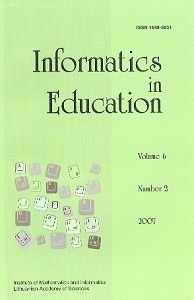Exploring the Effects of Near-Peer Teaching in Robotics Education: The Role of STEM Attitudes
Exploring the Effects of Near-Peer Teaching in Robotics Education: The Role of STEM Attitudes
Author(s): Isabelle C. de Vink, Jos L. J. Tolboom, Olivier van BeekumSubject(s): School education, ICT Information and Communications Technologies
Published by: Vilniaus Universiteto Leidykla
Keywords: robotics; programming; STEM; computational thinking; peer interaction;
Summary/Abstract: Due to technological advancements, robotics is findings its way into the classroom. However, workload for teachers is high, and teachers sometimes lack the knowledge to implement robotics education. A key factor of robotics education is peer learning, and having students (near-)peers teach them robotics could diminish workload. Therefore, this study implemented near-peer teaching in robotics education. 4 K10–11 secondary school students were teachers to 83 K5–6 primary school students. The intervention included 4 3-hour robotics lessons in Dutch schools. Primary school students completed a pre- and post-intervention questionnaire on their STEM-attitudes and near-peer teaching experience, and a report on their learning outcomes. Interaction with near-peer teachers was observed. After the lessons, a paired-samples t-test showed that students had a more positive attitude towards engineering and technology. Students also reported a positive near-peer teaching experience. Conventional content analysis showed that students experienced a gain in programming and robotics skill after the lessons, and increased conceptual understanding of robotics. The role the near peer teachers most frequently fulfilled was formative assessor. Near-peer teachers could successfully fulfil a role as an engaging information provider. This study shows that near-peer teachers can effectively teach robotics, diminishing workload for teachers. Furthermore, near-peer robotics lessons could lead to increased STEM-attitudes.
Journal: Informatics in Education - An International Journal
- Issue Year: 22/2023
- Issue No: 2
- Page Range: 329-350
- Page Count: 22
- Language: English

